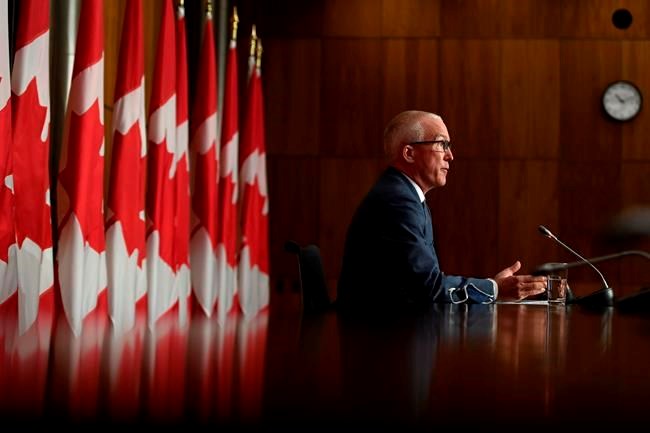OTTAWA — Canada’s military ombudsman Greg Lick is demanding the federal Liberal government end the “cycle of scandals” and immediately grant his office true independence and oversight powers over the Canadian Armed Forces.
Lick threw down the gauntlet in a fiery speech and report on Tuesday that took aim at the political, military and civilian leaders responsible for managing the Armed Forces, whom he all but accused of having let down service members and Canadians.
“Enough is enough,” Lick said during a news conference. “The cycle of scandals followed by studies, recommendations for independent oversight, half-solutions and resistance by the department and Canadian Armed Forces will only be broken when action is taken.”
The comments come as the military faces its most recent scandal, which involves allegations of sexual misconduct by senior military commanders. One of those was first flagged to Defence Minister Harjit Sajjan by Lick’s predecessor Gary Walbourne in March 2018.
Underlying much of the current crisis are questions of fairness and accountability in how the military handles such allegations, with anger that those higher up in the ranks appear to often be treated less severely than those near the bottom.
The scandal has also revived long-held concerns about political interference and cover ups when it comes to military misconduct.
The Liberal government has promised greater external oversight and accountability of the Armed Forces, and military leaders say they welcome the idea.
But the ombudsman says the reality is that senior commanders have fought tooth and nail to protect their authority from outside interference while their political masters essentially look the other way until another scandal erupts and the pattern repeats.
Lick, who is only the latest ombudsman to call for true independence and oversight powers, says the pattern first started in earnest after the Somalia scandal more than 20 years ago.
That scandal led to the creation of the ombudsman’s office, but Lick says the current construct has left the watchdog beholden to both the Defence Department and government thanks in part to the military’s resistance to external oversight.
“Despite apparent agreement in principle, all attempts at negotiating independence for this office have been scuttled by military and departmental leadership who have no interest in having an external organization authorized to review their behaviour,” his report reads.
Lick points as an example to what happened after retired Supreme Court justice Marie Deschamps released an explosive report on military sexual misconduct in 2015, in which the military agreed “in principle” to her calls for independent oversight but failed to act.
“Seven years after the report’s publication, and faced with a new wave of public outrage, military and departmental leaders are offering their mea culpas and promises to do better this time,” says Lick's report.
And while Lick did not indicate why successive governments have failed to ensure such commitments are followed through, he says the current system in which the ombudsman reports to the defence minister instead of Parliament has left the office open to interference.
Lick’s report says defence ministers have sat on the watchdog’s reports, directed the office when it comes to systemic investigations, and “seen inaction on sensitive information that could be unflattering to the Canadian Armed Forces and Department.”
Lick went further in his speech, saying: “When leaders turn a blind eye to our recommendations and concerns in order to advance political interests and their own self-preservation or career advancement, it is members of the defence community that suffer the consequences.”
The time for study is over, the ombudsman added, with his report including a long list of reviews that have been conducted and recommendations made over the past 25 years — most of which have been largely ignored and forgotten.
At the same time, he expressed his skepticism about retired Supreme Court justice Louise Arbour’s current review of ways to address sexual misconduct in the military and the appointment of Lt.-Gen. Jennie Carignan to oversee culture change in the Armed Forces.
Carignan on Tuesday released a message to the troops in which she lamented the “shocking testimonies” from victims of sexual misconduct in the ranks while describing the need for “reconciliation” between the military’s values and “how we live those values.”
Yet while she encouraged service members to “no longer be afraid of bluntly, shining a light on the problems that harm our members, weaken our mission and undermine our efforts,” her message did not contain any new initiatives to address the issue.
Lick’s report included draft legislation that he argued would enshrine in law his office’s independence and power to finally hold the military to account.
“If taken seriously and acted upon today, I strongly believe that the implementation of this way forward will help restore the trust military members and defence civilians need to have in their workplaces and on the battlefield,” he said.
“If discarded into the ether of talking points and bureaucratic doublespeak, we will have failed our members in uniform. … And failure will guarantee future victims.”
The Liberal government has said that all options are on the table when it comes to independent oversight of the military, but Prime Minister Justin Trudeau sidestepped a question Tuesday about when Canadians and service members can expect real action.
“We will be making significant changes to the way the military functions in the coming months as Madame Arbour begins to make recommendations concrete and we will take those actions necessary,” he said.
Lick’s report comes as Parliament prepares to rise for the summer and with a fall election widely expected. Conservative Leader Erin O’Toole in a statement suggested the only way real change will come is if the Liberals are defeated at the polls.
Conservative defence critic James Bezan in a separate statement said the party is “committed to making the defence ombudsman independent.”
This report by The Canadian Press was first published June 22, 2021.
Lee Berthiaume, The Canadian Press



